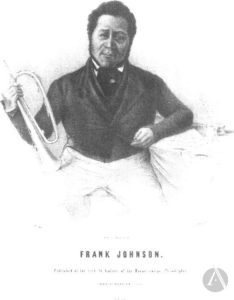TW: racism and violence
Francis or “Frank” Johnson, an African-American composer and performer, is said to have helped pave the way for Jazz and Ragtime, and therefore modern music as we know it. Johnson published works in a variety of genres and he was the first black composer to have his sheet music published and also the first black musician to tour Europe. His music was enjoyed by white and black people alike and he reached immense fame. However, he was still confronted by racism, hatred, and violence1.
 The text I would like to focus on this week is an article entitled “Riot Near Pittsburgh— Frank Johnson’s band mobbed”. The article was published in the Liberator in 1843 and covered the violence against Johnson and his band on March 17th in Pittsburgh after a performance benefitting the temperance movement. The writer reports
The text I would like to focus on this week is an article entitled “Riot Near Pittsburgh— Frank Johnson’s band mobbed”. The article was published in the Liberator in 1843 and covered the violence against Johnson and his band on March 17th in Pittsburgh after a performance benefitting the temperance movement. The writer reports
“A large rabble of men and boys gathered around the doors and windows, and by their hooting and yelling did what they could to mar the pleasure of those within, who had previously paid their money for a rare musical treat”“Francis Johnson”2.
My first instinct was to applaud this author for condemning the appalling racist behavior of the mob. However, upon digging deeper and thinking more critically I came to the realization that they were not condemning racist behavior per se, but disruptive behavior. Behavior that made themselves and their peers miss out on something they paid for. A commodity. There was no mention of the effect on Johnson or his band members beyond their physical injuries. The author then goes on to describe the attack on Johnson and his band after the show.
“The mob followed Mr. Johnson and his company shouting (a racial slur)… and hurling brick-bats, stones, and rotten eggs… One poor fellow was severely, it is feared dangerously wounded in the head, and others were more or less hurt… Every well disposed citizen deeply regretted the disgrace thus brought upon our city…”2.
The word choice leads us to believe the author was less concerned about the safety and well-being of Johnson and his band, but rather how the actions of the mob made the city look.
I do want to be clear that the article was written in a time where condemning the violence at all was very progressive, but I cannot help but wonder at the reasoning for the condemnation. Beyond the feelings of being sighted out of a show they paid for, the author likely has other motivations.
In their parting words in regards to this event, they state “of course no friend of the temperance enterprise could be engaged in this cowardly affair”2.
Clearly, not only is the writer offended by the ruining of their evening, but they also want to use it to push their own political agenda. By stating only people against the temperance movement would engage in violent mob behavior the reporter demonizes those against the abolition of alcohol.
Overall, the fact the creator of this article condemns the actions of the mob is a step in the right direction, but their motives do not feel pure to me.
1“Francis Johnson.” University Archives and Records Center, https://archives.upenn.edu/exhibits/penn-people/biography/francis-johnson.
2 “Riot Near Pittsburgh— Frank Johnson’s Band Mobbed.” Liberator, 9 June 1843, p. 93. ProQuest, https://www.proquest.com/americanperiodicals/docview/91225878/fulltextPDF/AEA86A48109E42E4PQ/1?accountid=351. Accessed 26 Sept. 2021.
